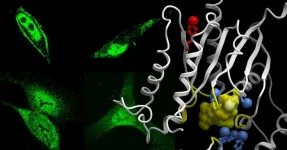(Press-News.org) Participants reacted quicker and made fewer errors during menstruation, despite believing their performance would be worse, according to new research from UCL and the Institute of Sport, Exercise & Health (ISEH).
The study, published in Neuropsychologia, is the first to assess sport-related cognition during the menstrual cycle and is part of a larger research project supported by the FIFA Research Scholarship.
The findings act as a proof-of-principle that specific types of cognition fluctuate throughout the menstrual cycle, which could have implications for injury and other aspects of women’s health.
Previous sports medicine research has shown that women seem to be at greater risk of sport-related injury during the luteal phase, which is the time between ovulation and menstruation. This is possibly related to the significant hormonal changes that occur throughout the menstrual cycle. But precisely how these changes are linked to an increased likelihood of injury are unknown at present.
In this study, researchers at UCL and ISEH collected reaction time and error data from 241 participants who completed a battery of cognitive tests 14 days apart. Participants also completed a mood scale and a symptom questionnaire twice. Period-tracking apps were used to estimate which phase of their cycle the participants were in when they took the tests.
The tests were designed to mimic mental processes that are typical in team sports. In one test, participants were shown smiling or winking faces and asked to press the space bar only when they saw a smiley face, to test inhibition, attention, reaction time and accuracy. In another, they were asked to identify mirror images in a 3D rotation task, which assesses spatial cognition. A task that asked them to click when two moving balls collide on screen measured spatial timing.
Though participants reported feeling worse during menstruation and perceived that this negatively impacted their performance, their reaction times were faster and they made fewer errors. For example, their timing was on average 10 milliseconds (12%) more accurate in the moving balls task, and they pressed the space bar at the wrong time 25% less in the inhibition task.
Participants’ reaction times were slower during the luteal phase, which begins after ovulation and lasts between 12-14 days up to the beginning of menstruation. They were on average 10-20 milliseconds slower compared to being in any other phase. They didn’t make more errors in this phase, however.
Dr Flaminia Ronca, first author of the study from UCL Division of Surgery and Interventional Science and ISEH, said: “Research suggests that female athletes are more likely to sustain certain types of sports injuries during the luteal phase and the assumption has been that this is due to biomechanical changes as a result of hormonal variation. But I wasn’t convinced that physical changes alone could explain this association.
“Given that progesterone has an inhibitory effect on the cerebral cortex and oestrogen stimulates it, making us react slower or faster, we wondered if injuries could be a result of a change in athletes’ timing of movements throughout the cycle.
“What is surprising is that the participant’s performance was better when they were on their period, which challenges what women, and perhaps society more generally, assume about their abilities at this particular time of the month.
“I hope that this will provide the basis for positive conversations between coaches and athletes about perceptions and performance: how we feel doesn’t always reflect how we perform.”
To put the findings in context, the authors say the fluctuation in timing could be the difference between an injury or not. Previous research has shown that a variation of just 10 milliseconds can mean the difference between a concussion and a lesser injury, for example. In the colliding balls task, participants’ timing was on average 12 milliseconds slower during the luteal phase compared to every other phase, a difference of 16%.
Dr Megan Lowery, an author of the study from UCL Surgery & Interventional Science and ISEH, said: “There’s lots of anecdotal evidence from women that they might feel clumsy just before ovulation, for example, which is supported by our findings here. My hope is that if women understand how their brains and bodies change during the month, it will help them to adapt.
“Though there’s a lot more research needed in this area, these findings are an important first step towards understanding how women’s cognition affects their athletic performance at different points during their cycle, which will hopefully facilitate positive conversations between coaches and athletes around performance and wellbeing.”
Professor Paul Burgess, senior author of the study from UCL’s Institute of Cognitive Neuroscience, said: “This study emerged from listening carefully to female soccer players and their coaches. We created bespoke cognitive tests to try to mimic the demands made upon the brain at the points in the game where they were telling us that injuries and problems of timing occur at certain times of the menstrual cycle.
“As suggested by what the soccer players had told us, the data suggested that women who menstruate – whether they are athletes or not – do tend to vary in their performance at certain stages of the cycle. As a neuroscientist, I am amazed that we don’t already know more about this, and hope that our study will help motivate increasing interest in this vital aspect of sports medicine.”
Notes to Editors:
For more information, please contact:
Dr Matt Midgley
+44 (0)20 7679 9064
m.midgley@ucl.ac.uk
Publication:
Flaminia Ronca et al. ‘Attentional, anticipatory and spatial cognition fluctuate throughout the menstrual cycle: potential implications for female sport’ will be published in Neuropsychologia and is strictly embargoed until Wednesday 5 June at 00:01 BST / Tuesday 4 June at 19:01 ET.
DOI: https://doi.org/10.1016/j.neuropsychologia.2024.108909
About UCL – London’s Global University
UCL is a diverse global community of world-class academics, students, industry links, external partners, and alumni. Our powerful collective of individuals and institutions work together to explore new possibilities.
Since 1826, we have championed independent thought by attracting and nurturing the world's best minds. Our community of more than 50,000 students from 150 countries and over 16,000 staff pursues academic excellence, breaks boundaries and makes a positive impact on real world problems.
The Times and Sunday Times University of the Year 2024, we are consistently ranked among the top 10 universities in the world and are one of only a handful of institutions rated as having the strongest academic reputation and the broadest research impact.
We have a progressive and integrated approach to our teaching and research – championing innovation, creativity and cross-disciplinary working. We teach our students how to think, not what to think, and see them as partners, collaborators and contributors.
For almost 200 years, we are proud to have opened higher education to students from a wide range of backgrounds and to change the way we create and share knowledge.
We were the first in England to welcome women to university education and that courageous attitude and disruptive spirit is still alive today. We are UCL.
www.ucl.ac.uk | Follow @uclnews on Twitter | Read news at www.ucl.ac.uk/news/ | Listen to UCL podcasts on SoundCloud | View images on Flickr | Find out what’s on at UCL Minds
END
Women’s mental agility is better when they’re on their period
2024-06-05
ELSE PRESS RELEASES FROM THIS DATE:
AIs are irrational, but not in the same way that humans are
2024-06-05
Large Language Models behind popular generative AI platforms like ChatGPT gave different answers when asked to respond to the same reasoning test and didn’t improve when given additional context, finds a new study from researchers at UCL.
The study, published in Royal Society Open Science, tested the most advanced Large Language Models (LLMs) using cognitive psychology tests to gauge their capacity for reasoning. The results highlight the importance of understanding how these AIs ‘think’ before entrusting them with tasks, particularly those involving decision-making.
In recent years, the LLMs ...
UMass Amherst to join $90M US National Science Foundation large-scale research infrastructure for education
2024-06-04
June 4, 2024
UMass Amherst to Join $90M US National Science Foundation large-scale research infrastructure for education
Platform brings together institutions, digital learning and a world-class team to enable research studies to inform efficacy, improvement and innovation in teaching and learning
AMHERST, Mass. – The Manning College of Information and Computer Sciences at the University of Massachusetts Amherst has joined the newly announced U.S. National Science Foundation’s (NSF) SafeInsights, a five-year, $90 million research and development infrastructure for inclusive education ...
Researchers discover neural circuit involved in compulsive eating even without hunger
2024-06-04
For the first time, researchers have identified a group of neurons deep in the brain that are associated directly with compulsive eating and food craving. The discovery is reported in an article published in Nature Communications by researchers at the University of California, Los Angeles (UCLA) in the United States and the Federal University of the ABC (UFABC) in São Bernardo do Campo, São Paulo state (Brazil).
The neurons are located in the periaqueductal gray, a region of the midbrain at the top of the brainstem, and are known as vesicular ...
Accelerating the R&D of wearable tech: Combining collaborative robotics, AI
2024-06-04
College Park, Md. — Engineers at the University of Maryland (UMD) have developed a model that combines machine learning and collaborative robotics to overcome challenges in the design of materials used in wearable green tech.
Led by Po-Yen Chen, assistant professor in UMD's Department of Chemical and Biomolecular Engineering, the accelerated method to create aerogel materials used in wearable heating applications – published June 1 in the journal Nature Communications – could automate design processes for new materials.
Similar to water-based ...
Chasing down a cellular ‘short circuit’
2024-06-04
A group of researchers at University of California San Diego has identified the cause of a “short-circuit” in cellular pathways, a discovery that sheds new light on the genesis of a number of human diseases.
The recent study, published in the journal Science Signaling, explores the biochemical mechanism that can interrupt the cellular communication chain — a disruptive interaction that Pradipta Ghosh, M.D., likens to a game-ending “buzzer.” Ghosh, a professor in the Departments of Medicine and Cellular and Molecular Medicine ...
When mothers and children talk about problems, environment matters
2024-06-04
URBANA, Ill. – Talking to their parents about daily stressors can help adolescents deal with their problems. This is particularly important during the transition to middle school, when youth often are faced with new peer and academic challenges. But does it matter where these conversations take place? That’s the topic of a new study from the University of Illinois Urbana-Champaign.
“We were interested in the environmental settings for mother-youth conversations. Where do they typically happen, and what are the preferred locations? We wanted to get the perspectives of both the youth and their ...
How tumor stiffness alters immune cell behavior to escape destruction
2024-06-04
Immunotherapy is based on harnessing a person’s own immune system to attack cancer cells. However, patients with certain tumors do not respond to these therapies and it remains unclear why.
“The full impact of anti-cancer immunotherapy has not been realized, especially for some solid tumors,” says Kevin Tharp, Ph.D., assistant professor in the Cancer Metabolism and Microenvironment Program at Sanford Burnham Prebys.
Researchers presume that part of the reason why these therapies fail is due to tumor-associated fibrosis, the creation of a thick layer of fibrous collagen (like scar tissue) that acts as a barrier ...
Convergence and collaboration to achieve circularity
2024-06-04
The linear consumption model of raw material extraction, production, use, and disposal dominates the global economy, but it’s led to serious unintended global consequences: from resource use to pollution including negative impacts on environmental and human health that disproportionately affect the Global South.
In contrast, circular economy – a model where products and materials are by design kept in continual use – aims to decouple economic growth from resource consumption.
While approaches ...
Wayne State University partners with Great Lakes Water Authority to help train water pipeline managers of the future
2024-06-04
DETROIT — The Great Lakes Water Authority (GLWA) has partnered with Wayne State University to develop its Workforce Development and Pipe Management Program, which will help recruit, teach and graduate the next generation of water pipeline managers. The two-year program will begin July 1, 2024, and will be supported by a contract totaling more than $480,000.
The GLWA says that water utilities are experiencing significant employee recruitment, training and retention challenges. An additional concern is the availability of specialized technical training that addresses recent technological advances in the water sector. In response to these challenges, the Workforce Development and ...
NRG Oncology abstract considered “best of ASCO” for 2024 shows difference in outcomes for node-negative versus node-positive pancreatic cancer patients when adding chemoradiation to systemic therapy
2024-06-04
NRG Oncology recently reported the results from the radiotherapy randomization, which was the second step of their NRG-RTOG 0848 clinical study comparing adjuvant chemotherapy with or without chemoradiation for patients with resected periampullary pancreatic adenocarcinoma. The trial data did not show that the addition of radiation and chemotherapy to adjuvant systemic therapy improved overall survival (OS) for all patients on the study, however, OS was improved among node-negative patients. OS was essentially the same between treatment arms for node positive patients. The trial data also showed that disease-free survival (DFS) was improved with ...



